| Listing 1 - 10 of 41 | << page >> |
Sort by
|
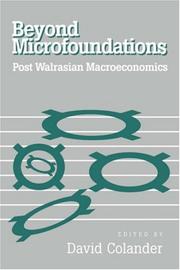
ISBN: 0521552370 0521034582 1139174622 9780521552370 9781139174626 9780521034586 Year: 1996 Publisher: Cambridge: Cambridge university press,
Abstract | Keywords | Export | Availability | Bookmark
 Loading...
Loading...Choose an application
- Reference Manager
- EndNote
- RefWorks (Direct export to RefWorks)
Beyond Microfoundations discusses the foundations for a post-Walrasian macroeconomics and, in doing so, carries the work of Robert Clower and Axel Leijonhufvud to the present. This book spells out both why an alternative approach to macro is needed, and what the essence of the approach will be. This post-Walrasian approach to macro is neither Keynesian nor Classical, both of which have Walrasian foundations, but it offers an approach to macro in which Walrasian economics is turned on its head. Specifically, it rejects the Walrasian ad hoc assumptions of the existence of a unique equilibrium and of simple dynamics. That rejection leads one to a fundamentally different conception of macro than most macroeconomics have implicit in their formal model. Post-Walrasian macroeconomics offers a vision of macro in which micro foundations devoid of an explicit macro context have no place, but one in which institutions have a fundamental role. Post-Walrasian macroeconomics provides a foundation for an alternative macroeconomics for the twenty-first century built on the edges of chaos.
Macroeconomics --- Walras, Léon --- Macroeconomics. --- Microeconomics. --- Economics, Mathematical. --- Walras, Leon, --- Walras, Léon, --- Business, Economy and Management --- Economics --- Walras, Léon, - 1834-1910. --- Walras, Léon, --- Mathematical economics --- Econometrics --- Mathematics --- Price theory --- Methodology --- Walras, Marie Esprit Léon,
Book
ISBN: 9781848446397 9781848446410 184844639X 1848446411 Year: 2009 Publisher: Cheltenham: Elgar,
Abstract | Keywords | Export | Availability | Bookmark
 Loading...
Loading...Choose an application
- Reference Manager
- EndNote
- RefWorks (Direct export to RefWorks)
David Colander's highly original and thought provoking book considers ongoing changes in graduate European economics education. Following up on his earlier classic studies of US graduate economic education, he studies the 'economist production function' in which universities take student 'raw material' and transform it into economists, in doing so he provides insight into economists and economics.He argues that until recently Europe had a different 'economist production function' than did the US; thus European economists were different from their US counterparts. However, this is now changing, and Colander suggests that the changes are not necessarily for the best. Specifically, he suggests that in their attempt to catch up with US programs, European economics is undermining some of their strengths - strengths that could allow them to leapfrog US economics in the future, and be the center of 21st century economics. Student views on the ongoing changes and ensuing difficulties are reported via surveys of, and interviews with, students in global European graduate programs. The conclusion draws broad policy implications from the study, and suggests a radically different market approach to funding economic research that Colander argues will help avoid the pitfalls into which European economics is now falling.This unique and path-breaking book will prove essential reading for economists, as well as academics, students and researchers with a special interest in economics education, the methodology of economics, or the history of economic thought.
Economics --- Europe --- Economists --- Study and teaching (Graduate) --- AA / International- internationaal --- 330.08 --- 658.334 --- -Economists --- -330.092 --- Social scientists --- Economic theory --- Political economy --- Social sciences --- Economic man --- Economisten. --- Beroepsvorming en -oriëntatie. Menselijke investeringen. Menselijk kapitaal. --- 330.092 --- Economisten --- Beroepsvorming en -oriëntatie. Menselijke investeringen. Menselijk kapitaal --- Economics - Study and teaching (Graduate) - Europe --- Economists - Europe
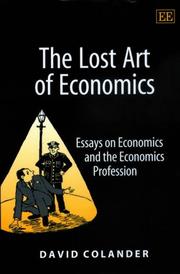
ISBN: 1840646942 9781840646948 Year: 2001 Publisher: Cheltenham: Elgar,
Abstract | Keywords | Export | Availability | Bookmark
 Loading...
Loading...Choose an application
- Reference Manager
- EndNote
- RefWorks (Direct export to RefWorks)
Economic order --- Economists --- Economics --- Study and teaching --- History --- Vocational guidance --- AA / International- internationaal --- 330.3 --- economie --- macro-economie --- onderwijsmethoden --- Methode in staathuishoudkunde. Statische, dynamische economie. Modellen. Experimental economics. --- Social scientists --- Economic theory --- Political economy --- Social sciences --- Economic man --- Study and teaching&delete& --- Methode in staathuishoudkunde. Statische, dynamische economie. Modellen. Experimental economics --- Economics - Study and teaching - History --- Economics - Vocational guidance
Book
ISBN: 0873327764 9780873327763 Year: 1991 Publisher: Armonk (N.Y.): Sharpe,
Abstract | Keywords | Export | Availability | Bookmark
 Loading...
Loading...Choose an application
- Reference Manager
- EndNote
- RefWorks (Direct export to RefWorks)
Economics --- Economists. --- Methodology. --- AA / International- internationaal --- 330.08 --- 330.3 --- Economisten. --- Methode in staathuishoudkunde. Statische, dynamische economie. Modellen. Experimental economics. --- Economists --- Methodology --- Economisten --- Methode in staathuishoudkunde. Statische, dynamische economie. Modellen. Experimental economics --- Social scientists --- Economics - Methodology.
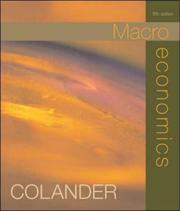
ISBN: 0072551194 9780072551198 Year: 2004 Publisher: Boston: McGraw-Hill,
Abstract | Keywords | Export | Availability | Bookmark
 Loading...
Loading...Choose an application
- Reference Manager
- EndNote
- RefWorks (Direct export to RefWorks)
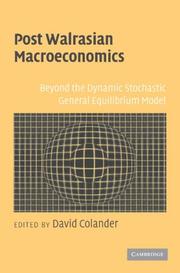
ISBN: 052168420X 0521865484 9780521865487 9780521684200 9786610567669 9780511225925 051122592X 9780511617751 1107169984 128056766X 0511224648 0511226497 051131809X 0511617755 0511225318 9780511226496 0511223307 9780511223303 9781280567667 6610567662 9780511224645 Year: 2006 Publisher: Cambridge: Cambridge university press,
Abstract | Keywords | Export | Availability | Bookmark
 Loading...
Loading...Choose an application
- Reference Manager
- EndNote
- RefWorks (Direct export to RefWorks)
Macroeconomics is evolving in an almost dialectic fashion. The latest evolution is the development of a new synthesis that combines insights of new classical, new Keynesian and real business cycle traditions into a dynamic, stochastic general equilibrium (DSGE) model that serves as a foundation for thinking about macro policy. That new synthesis has opened up the door to a new antithesis, which is being driven by advances in computing power and analytic techniques. This new synthesis is coalescing around developments in complexity theory, automated general to specific econometric modeling, agent-based models, and non-linear and statistical dynamical models. This book thus provides the reader with an introduction to what might be called a Post Walrasian research program that is developing as the antithesis of the Walrasian DSGE synthesis.
Macroeconomics --- Equilibrium (Economics) --- Mathematical models. --- -Equilibrium (Economics) --- -339.015195 --- Disequilibrium (Economics) --- Economic equilibrium --- General equilibrium (Economics) --- Partial equilibrium (Economics) --- Economics --- Stagnation (Economics) --- Statics and dynamics (Social sciences) --- Mathematical models --- -Electronic information resources --- Electronic information resources --- E-books --- Equilibrium (Economics). --- DGE (Economics) --- DSGE (Economics) --- Dynamic stochastic general equilibrium (Economics) --- SDGE (Economic theory) --- Business, Economy and Management --- Macroeconomics - Mathematical models.

ISBN: 0691138516 9780691125855 0691125856 9786612158728 1282158724 1400828643 9781400828647 9780691138510 Year: 2008 Publisher: Princeton: Princeton university press,
Abstract | Keywords | Export | Availability | Bookmark
 Loading...
Loading...Choose an application
- Reference Manager
- EndNote
- RefWorks (Direct export to RefWorks)
Economists seem to be everywhere in the media these days. But what exactly do today's economists do? What and how are they taught? Updating David Colander and Arjo Klamer's classic The Making of an Economist, this book shows what is happening in elite U.S. economics Ph.D. programs. By examining these programs, Colander gives a view of cutting-edge economics--and a glimpse at its likely future. And by comparing economics education today to the findings of the original book, the new book shows how much--and in what ways--the field has changed over the past two decades. The original book led to a reexamination of graduate education by the profession, and has been essential reading for prospective graduate students. Like its predecessor, The Making of an Economist, Redux is likely to provoke discussion within economics and beyond. The book includes new interviews with students at Harvard, Princeton, Stanford, MIT, Chicago, and Columbia. In these conversations, the students--the next generation of elite economists--colorfully and frankly describe what they think of their field and what graduate economics education is really like. The book concludes with reflections by Colander, Klamer, and Robert Solow. This inside look at the making of economists will interest anyone who wants to better understand the economics profession. An indispensible tool for anyone thinking about graduate education in economics, this edition is complete with colorful interviews and predictions about the future of cutting-edge economics.
475 --- -Graduate students --- -330.071173 --- Onderwijs van de politieke, economische en sociale wetenschappen. --- Graduate students --- Economists --- Economics --- Economic theory --- Political economy --- Social sciences --- Economic man --- Study and teaching (Graduate) --- United States --- 330.071173 --- 330.08 --- AA / International- internationaal --- US / United States of America - USA - Verenigde Staten - Etats Unis --- Economisten --- Onderwijs van de politieke, economische en sociale wetenschappen --- United States of America
Book
ISBN: 0884109992 Year: 1984 Publisher: Cambridge Ballinger
Abstract | Keywords | Export | Availability | Bookmark
 Loading...
Loading...Choose an application
- Reference Manager
- EndNote
- RefWorks (Direct export to RefWorks)
Competition --- Monopolies --- Neoclassical school of economics --- Rent --- 330.00 --- 330.48 --- 338.011 --- AA / International- internationaal --- Ground-rent --- Payment --- Landlord and tenant --- Real property --- Cambridge school of economics --- Marshallian economics --- Classical school of economics --- Schools of economics --- Combinations in restraint of trade --- Commercial corners --- Corners, Commercial --- Engrossing --- Forestalling --- Commercial crimes --- Trade regulation --- Monopolistic competition --- Monopsonies --- Restraint of trade --- Trusts, Industrial --- Congresses --- Economische en sociale theorieën: algemeenheden --- Neo-klassiekers en andere post-keynesiaanse theorieën. Public choice. Institutionalisten. Home economics. Analyseschool van de transactiekosten --- Rentetheorie. Wet van de toenemende en afnemende rendementen --- Law and legislation --- Conferences - Meetings --- Economics
Book
ISBN: 0256157030 Year: 1994 Publisher: Burr Ridge, Ill. Irwin
Abstract | Keywords | Export | Availability | Bookmark
 Loading...
Loading...Choose an application
- Reference Manager
- EndNote
- RefWorks (Direct export to RefWorks)
000.1 --- 33 --- Algemene werken --- Economie --- Economics
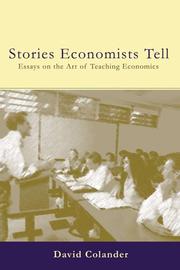
ISBN: 9780073227511 007322751X Year: 2006 Publisher: Boston: McGraw-Hill,
Abstract | Keywords | Export | Availability | Bookmark
 Loading...
Loading...Choose an application
- Reference Manager
- EndNote
- RefWorks (Direct export to RefWorks)
| Listing 1 - 10 of 41 | << page >> |
Sort by
|

 Search
Search Feedback
Feedback About UniCat
About UniCat  Help
Help News
News